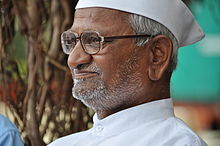Anna Hazare
Anna Hazare | |
|---|---|
 Anna Hazare in Nanded, Maharastra | |
| Born | Kishan Baburao Hazare 15 June 1937 |
| Nationality | Indian |
| Other names | Kisan Baburao Hazare |
| Organisation | India Against Corruption |
| Known for | Indian anti-corruption movement - 2012, Indian anti-corruption movement - 2011, Watershed development programmes, Right to Information |
| Movement | Indian anti-corruption movement, Peace movement |
| Spouse | Married |
| Parent(s) | Laxmanbai Hazare Baburao Hazare |
| Awards | Padma Shri (1990) Padma Bhushan (1992) |
| Website | www www |
Kisan Baburao Hazare known as Anna Hazare (born 15 June 1937) is an Indian social activist. He is known for developing a village called Ralegaon Siddhi in India. He played a large part in the 2011 Indian anti-corruption movement. He has served in the Indian Army. He won the third highest award in India, the Padma Bhushan.
In April 2011, he started an indefinite hunger strike to pressurize the Indian Government to accept his demands on corruption. The Government accepted his demands later, and he ended his fast.
In August 2011, he started another hunger strike.[1][2][3] This time, he wanted the Government to pass an Ombudsman bill. He ended the fast after the Parliament of India accepted his demands. This movement got a lot of support from city people across India.
Hazare has been criticized for many things like his strong views on justice, and forced vasectomy to control population.[4][5]
Childhood and early life [6]
[change | change source]He was born as kisan baburao hazare in ralegon siddhi village near ahmednagar as a eldest son of baburao hazare and laxmi bai. his father was an unskilled laborer and the family struggled to make end meet. Anna hazare tooks upon himself the responsibility of education and took him to mumbai where he was admitted into local school. however, due to financial strains the relative had to stop the boy's education while in seventh standard. Anna hazare strat his livlehood by selling flowers on railway stations.
Career [7]
[change | change source]- He joined the Indian Army in 1960. He was trained at Aurangabad and initially he worked as an army truck driver.
- He was posted at the border in the Khem Karan sector during the Indo-Pakistan War in 1965 where he miraculously survived an enemy attack. This incident shook him and for a time he even considered committing suicide.
- However, war time experiences in which he emerged to be the sole survivor made him think about the meaning of life. He began reading the works of great minds like Swami Vivekananda, Mahatma Gandhi and Vinoba Bhave which made him realize that he should be doing something purposeful in his life.
- During his stint in the army he was posted at different places like Punjab, Sikkim, Bhutan, Mizoram, Maharashtra, and Jammu. He was honorably discharged from the army in 1975 after 15 years of service. He returned to his native village of Ralegan Siddhi and was dismayed to find it plagued by the issues of abject poverty, water problems, alcoholism and hopelessness. He was determined to do something about it. He gathered some like-minded youths and organized a ‘Tarun Mandal’ or Youth Association to work towards rebuilding the village. Alcoholism was a major problem affecting the men and the Mandal helped to close down over thirty liquor breweries. Followed their success in controlling alcoholism, the youths also decided to ban the sale of other intoxicating and dangerous substances like tobacco and cigarettes, which are now no longer sold there. [1]
Major Work[8]
[change | change source]He was the only one man behind the transformation of village ralegan siddhi from the poverty ridden, hopeless place with huge population of alcoholics and drug addict to a "model village" based on sustainable development. he played a key role in persuading the Government of India to pass the The Lokpal and Lokayuktas Act, 2013. Anna hazare had been campaigning for years, often going on indefinite fasts in his bid to make the government take action towards creating a strong anti-corruption act.
References
[change | change source]- ↑ Kohari, Alizeh (16 August 2011). "Hunger strikes: What can they achieve?". BBC News.
- ↑ "Anna Hazare - Biography & Facts About Anna Hazare". Knowledge Publisher. Archived from the original on 1 September 2011. Retrieved 21 August 2011.
- ↑ Yardley, Jim (18 August 2011). "Unlikely Echo of Gandhi Inspires Indians to Act". The New York Times. Retrieved 19 August 2011.
- ↑ Hartosh Singh Bal (14 April 2011), "Spare Us the Gandhian Halo", The Open Magazine, retrieved 18 August 2011
- ↑ Amit Varma, The Rorschach Effect in Indian Politics, Yahoo! News, retrieved 18 August 2011
- ↑ "childhood and early life". Retrieved 2018-06-25.
- ↑ "Career". Retrieved 2018-06-25.
- ↑ "Major work". Retrieved 2018-06-25.
